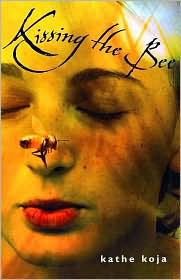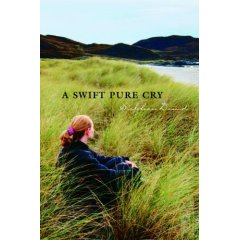YA Round-Up: James Jauncey,
Siobhan Dowd, and Kathe Koja
 January 10th, 2008 by jules
January 10th, 2008 by jules
It’s a new year, and new titles may be rolling in (both review copies as well as new additions to my local library’s shelves), but I’m still catching up with 2007. Here are reviews of three YA titles I read and enjoyed over the holidays. Let’s get right to it.

by James Jauncey
Young Picador
August 2007
(review copy)
In the Fall of last year, Scottish author James Jauncey presented this taut, edge-of-your-seat dystopian thriller to the world of YA lit, and it seems to be vying for most under-the-radar title of the year, according to my web search. Jauncey had me at the book’s opening where he quotes, before the book begins, the brilliant composer Arvo Pärt (“If you approach silence with love, music may result”), but I digress. Set in the Scottish Highlands at a time in “the not-too-distant future” during a violent war over land ownership reform (and based on Scotland’s very real Land Reform Act of 2003), we meet eighteen-year-old John MacNeil, who is the sole witness to a bloody massacre at the hands of the despotic government, in conflict with terrorists who oppose their tyrranical reign. After eventually returning to the scene of the violence, he finds Ninian, a young, mentally-disabled boy, terrified into silence (John later learns Ninian has Fragile X Syndrome). The two flee into the mountains, pursued by soldiers and up against the harsh winter landscape, with John’s goal being to find his own father and return Ninian to whomever his family may be, eventually discovering the boy has strong ties to the rebel cause, ties John couldn’t have possibly imagined.
The heart of the story is John, a complex hero and rather tortured soul. He is a young man who finds solace in silence and music and who struggles with his own issues of anger and loss after the death — years earlier — of his precocious younger brother, Davie, and his parents’ divorce; his own trauma of being the only witness to such a bloody massacre; and his struggles with Ninian, a most challenging child (“trapped in his own weird little world”), suddenly in his care. The novel poses complicated, sensitive questions to teens: How can one trust after such trauma? What is the inner world of those who are mentally disabled (“what was the unknown world {Ninian} carried inside of him? For surely everyone had some kind of skeleton that held up their lives, didn’t they? Some kind of framework of memories and feelings, people and places and things?”); how can we avoid labelling such children as if “they’re specially gifted. Like . . . holy fools”; and, most potently, questions of revenge, war, and political activism, John being advised later by a key figure: “if you want to live your life to the full from now on, if you want to engage with the world and make your mark, if you want to find your true purpose, John, you can’t just sit on the fence like a dithering youngster.” As Jill Murphy wrote here, “{d}ull-as-ditchwater citizenship lessons are unlikely to persuade apathetic teenagers to make their first cross on a ballot paper, but reading books like this will open up ideas and possibilities that will.” A gripping, intense read that will surely please teens who eagerly consumed Will Hobbs’ titles in their middle school years.

by Kathe Koja
Farrar, Straus and Giroux
August 2007
(review copy)
Ah, to construct a novel around one huge metaphor and make it work must be a difficult task, indeed. To sustain it. To keep it alive and renewed and refreshed on each page. Koja does it and does it well in this short novel, the first one I’ve read by her (though I’ve always wanted to read 2004’s Buddha Boy). It’s Dana’s senior year, and she and her best friend, Avra, and Avra’s boyfriend, Emil, are doing things as simple as planning for prom and as complicated as planning their lives when the year is over: The fiery, volatile, mercurial Avra plans to skip town to nowhere with Emil, and the more even-keeled Dana, who realizes she’s fallen for Emil, doesn’t quite know what she plans to do. She’s simply trying to get by day-to-day, seeing Emil and Avra together, despite the fact that she gets serious vibes from Emil himself. But, you see, there can only be one Queen Bee in each hive, and that is most assuredly Avra. This is a multi-layered novel — again, all wrapped around one effective metaphor at its center — about one teen’s journey to self-acceptance, and it never condescends to the teen reader, nor does Koja feel like she absolutely must wrap things up tidily in the end. Opening each chapter with either fact or folklore about the world of bees, she immediately reels the reader in with her spot-on pacing and the complex, flawed, courageous heroine that is Dana. And a whole Poetry Friday entry, I might add, could be constructed around the book’s final, eloquent paragraph. Did you know that one myth about bees states that…
a bee’s sting directly on the lips is what first brought poetry into the world of humans. The pain she inflicts, says this myth, is equal to the worth of the wisdom she inspires. This is called “kissing the bee.”
A highly recommended, eloquent coming-of-age story about first love, loss, and forging one’s own identity.

by Siobhan Dowd
David Fickling Books
April 2007
(review copy)
It was sad enough to read last year about Siobhan Dowd’s losing battle against breast cancer, but then to read this gorgeously-crafted story of redemption after her death, as I did, and realize that no more such beauty would be coming from Dowd’s pen was even sadder. It’s 1984 in Ireland. Fifteen-year-old Michelle, who goes by Shell, is now living without her mother, who died a year earlier. She lives in near poverty with her father, now almost maniacally religious and an alcoholic, and her younger siblings, Jimmy and Trix. Normally unaffected by church, Shell — who is not even sure she’s a believer after the loss of her mother (“Mam wasn’t going anywhere. She was going nowhere, to nothing . . . In Shell’s mind, Jesus got off the cross and walked off to the nearest bar”) — takes a sudden interest in the new, rather bumbly priest, Father Rose, and equates his apearance as a second coming of Christ in her life (“A miracle happened. Jesus came out of the bar and got right back up on the high cross. Mam danced in heaven, waltzing with the spirits”). The first half of the novel deals with Shell’s home life, relationship with sexually-charged and persuasive classmate Declan, and her inner reawakening with the appearance of Father Rose. But then the novel takes a breathtaking turn (“at this point, the tenor of the novel smoothly and inexorably changes from an introspective examination of grief and loss, to a mystery with a thriller’s momentum,” wrote Publishers Weekly) when a scandalous crime occurs in this small town of Coolbar, inextricably linked to Shell and yet another devastating loss she’s forced to undergo after she turns to Declan for companionship. Like hell I’m going to tell you what that is, ’cause I don’t want to ruin this unforgettable read for you. Dowd’s complex, fully-realized characters are intricately crafted (particularly her generously sympathetic treatment of Shell’s emotionally-ravaged father), and she so firmly lodges the reader in the time and place of her story that it’s difficult to break away when you put the book down (though I found it difficult to even put the book down after the sudden shift in plot mid-way through the novel). Dowd writes with the kind of easy, never-cloying lyricism that would often make me pause and . . . well, just savor (“the words fell out like a suit of old clothes,” she writes after Shell finally spills a huge secret). A superb debut novel. I only wish we could read more from Dowd.

I liked Kissing the Bee. I’ve read all six of her YA novels, and this was by far my favorite.
Hoo, boy, these all three sound like seven kinds of fabulous — I still am too sad to read Sioban Dowd’s book, but the Scottish one I have to grab just because I’m here! And I do love some good dystopia; it suits my all-is-lost melancholic nature.
I love the idea of poetry and a bee-sting! Gives fully new meaning to bee-stung lips…
Thanks, you all. TadMack, let me know if you like The Witness. It has been criticized for ending too tidily, but I dunno, it worked for me. Sometimes I think it’s too easy to criticize a book for that. It’s when “tidy” doesn’t work within the context of the story when it’s distracting, but to me tidy was called for in this one. Rather, it didn’t make me say, hubba wha?
Wowee. Each of these sounds painfully beautiful. I’m dying over that poetry definition…
While I appreciated the quality of the language in A Swift Pure Cry, I just couldn’t get into the second half of the book – especially since I’d seen some plot points coming a mile away, and the whole police investigation felt like part of a completely different story. I had no idea the author had died, which brings up all kinds of interesting questions about how biographical information influences one’s reading of a book…
Hi Jules, I saw that there’s another Siobhan Dowd book coming out from David Fickling Books this summer called Bog Child.
Thanks, Joanna. Yes, I was also told that Dowd was actually working on two novels when she died; one was almost ready for publishing, one was ready for editing. Random House will be publishing them both. And, yes, Bog Child comes out later this year.
Jess, the turn the novel’s plot took mid-way-ish very much surprised me, but I didn’t find it distracting, as you did. And I’m not sure if you’re saying that knowing the author died must have influenced my reading of the book (??) or if you’re saying that it might have influenced yours. But, sure, it is an interesting topic, this issue of biographical criticism and how it plays into one’s reading.
I think knowing that she’d died might’ve changed MY reading of the book – much like knowing that The Golden Dream of Carlo Chuchio was Lloyd Alexander’s last book was something I was aware of, and probably influenced how I read the book. Personally, it would’ve given me a sympathy for the author that may – or may not – have bled into the book itself.
I read it for a Mock Printz workshop and there were many people there who loved it and stood up for it – I didn’t assume that your admiration came from anything other than just plain thinking it was a good read! I didn’t mean for the comment to come off that way.
Oh, I understand, Jess. I didn’t take it that way. Just wasn’t sure what you meant. It is an interesting topic, no? It’ll be interesting to read Bog Child this year for sure.
Thanks for commenting!
Thanks for the very good words on the BEE! It’s especially pleasing to see that you liked Dana so much – I adored her, such a strong, modest, funny kid who has no idea how awesome she is. I see more than a few girls like her, out there in the world, all the time; I hope they can recognize themselves in Dana, as a kindred spirit and soul in the mirror. Girls really need to be told how great they are, and can be.
I have read Kissing the Bee and Buddha Boy and liked both of them.